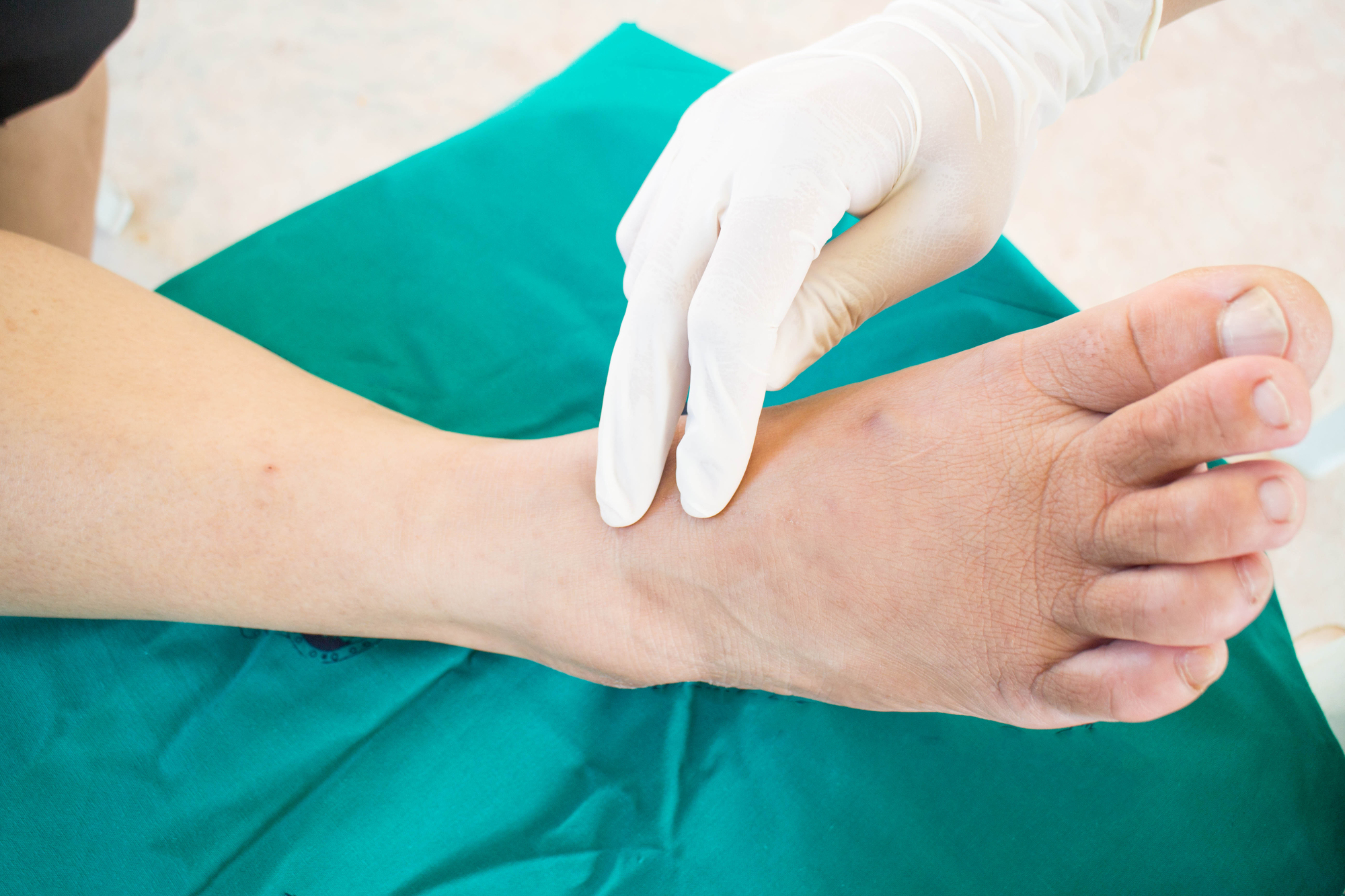When you have diabetes, it is common to develop problems with the nerves in your body. It is estimated that approximately 60 percent of diabetics have some form of nerve issues resulting in foot pain. Around 10 percent of people without diabetes may have symptoms of nerve damage. It is as high as 40 percent for people who have diabetes.
Diabetic Neuropathy
The most common cause for diabetic foot pain is Peripheral Neuropathy. This is a condition where your nerves are damaged by the process of the disease. There are three different types of diabetic neuropathy. They are sensory, motor and autonomic.
Sensory neuropathy is the most common type. This is most often described as sensitive pain. The level of discomfort is not proportional to the amount of damage causing it. Individuals who have sensory neuropathy can experience pain by simply putting a cover on their feet or having anything touch their skin. Some of the most common symptoms are a stabbing pain as well as a tingling or burning sensation.
With motor neuropathy, a diabetic’s nerves and muscles become affected. It can cause a person’s muscles to feel achy and weak. This condition will affect the small muscles of a diabetic’s feet. It can cause a walking imbalance. Inflammation of the skin and increased callous formation and pain can occur.
Autonomic neuropathy is a condition that impacts a person’s nerves, not under their conscious control. This could cause a change in a person’s sweating mechanism, dry cuticles and nails as well as skin that is cracked and stiff. It can cause increased fungal and bacterial infections. This will result in an increased amount of foot pain.
Luckily, there are a variety of treatments for neuropathy.
Nerve and Blood Vessel Damage
When your body is exposed to high blood sugar for an extended period of time, damage to delicate nerve fibers can result. The high blood sugar makes it difficult for the nerves to send important signals in the body. This also weakens the walls of a body’s small blood vessels making it more difficult to have important nutrients and oxygen supplied. Diabetes can aggravate genetic factors that make individuals susceptible to nerve damage. Drinking too much alcohol and smoking can cause problems with the nerves and blood vessels in a diabetic’s feet.
Neuropathy Relief
If you have a flare-up of diabetic neuropathy, there are a number of ways you can get relief. The first thing to do is check your blood sugar levels. It needs to be checked for the past several days and weeks. This is to see if there are any upward trends. When a diabetic’s blood sugar has a trend of increasing, this can result in foot pain. Sometimes relief can be experienced by massaging the feet with diabetic foot cream. Physicians may recommend their diabetic patient wear supportive shoes as well as foot inserts. This will help protect the feet from the pressure and pounding that can result from wearing shoes not designed for diabetics.
Prevention
There are some types of diabetic neuropathy that can be prevented. Researchers have determined that when diabetics maintain healthy living habits their incidents of neuropathy can be dramatically decreased or eliminated. This will require a diabetic to focus on eating a nutritious diet and regularly exercise. They should never indulge in excessive alcohol consumption. Every effort must be made to avoid exposure to toxic chemicals and any type of injury. Any underlying disorders affecting a diabetic must also be carefully managed.
Medications
Some treatments for neuropathy may involve medications. If you have mild neuropathy symptoms, there are a number of over-the-counter medications that can help. Physicians recommend you try a nonsteroidal anti-inflammatory drug.
Medications that contain opioids are discouraged. The use of opioid drugs such as tramadol or oxycodone can create addiction or dependence. In some cases, anti-seizure medications are effective. These are medications such as pregabalin or gabapentin. A person taking these medications needs to know the side effects include dizziness as well as drowsiness.
In some situations, antidepressant medication is effective. This works by affecting the parts of a person’s brain as well as the spinal cord that enables them to experience pain. A person taking these types of drugs may experience dry mouth, constipation, a decrease in appetite as well as nausea, dizziness and drowsiness.
Therapy
There are a number of different therapies available to help ease your symptoms associated with diabetic foot pain. Transcutaneous electrical nerve stimulation (TENS) has a high degree of success. During this procedure, adhesive electrodes are attached to the affected areas of skin on a person’s body. Gentle electric current is then delivered to the area at different frequencies. You will receive this treatment for approximately half an hour each day for a month. Plasma exchange requires having antibodies and certain proteins removed from a person’s blood. The blood is removed and then placed back into a person’s body.
Alternative Therapies
There are a few alternative therapies that have shown promise in treating diabetic foot pain. Acupuncture has been used effectively. It involves a trained professional putting needles into different areas of a person’s body. Most people will require a number of acupuncture treatments to alleviate symptoms. Acupuncture is accepted as a safe treatment when done by a practitioner who is certified. They will know to use sterile needles and where they should be placed.
A treatment that has been popular in Europe for many years is Alpha-lipoic acid. It has also helped many people in the United States. It is important a person discuss using Alpha-lipoic acid with their physician. It can cause a skin rash, upset stomach as well as affect blood sugar levels.
There are also certain herbs that are effective in treating foot pain caused by neuropathy. A common effective herb could be some form of primrose oil. It is important to discuss using herbs with a physician as some do interact with medications.
Others have had success using fish oil supplements. Researchers believe the omega-3 fatty acids improve blood flow as well as decreases inflammation. It should not be used with anti-clotting medications.
Healthy Lifestyle Choices
Experts recommend a person focus on having a healthy lifestyle to avoid diabetic foot pain. This includes eating a diet with plenty of vegetables, fruits and whole grains as well as lean meats. This will help keep your nerves healthy. Regular exercise will also enable you to avoid problems caused by diabetes. You should also avoid spending an extended time in a cramped position as well as making repetitive motions.

